Unit 2 Section A(1a-2d)-【精品课】2023-2024学年七年级英语下册同步精品课件(人教版)
文档属性
| 名称 | Unit 2 Section A(1a-2d)-【精品课】2023-2024学年七年级英语下册同步精品课件(人教版) | 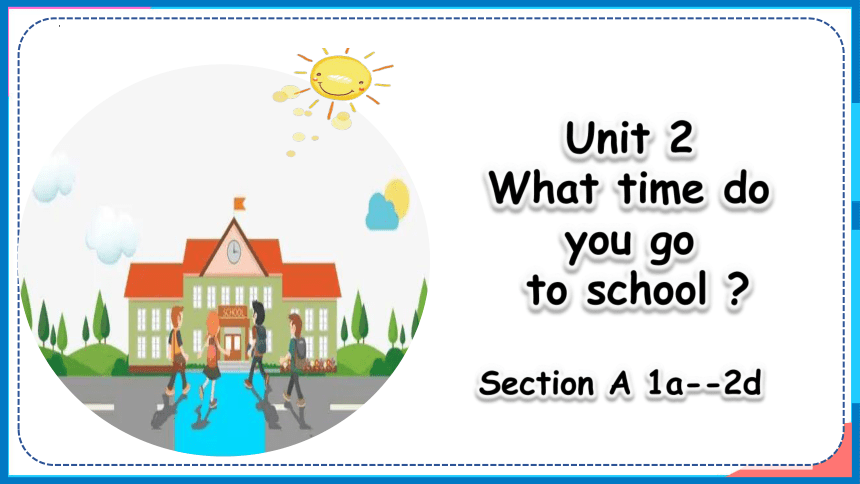 | |
| 格式 | pptx | ||
| 文件大小 | 15.9MB | ||
| 资源类型 | 试卷 | ||
| 版本资源 | 人教新目标(Go for it)版 | ||
| 科目 | 英语 | ||
| 更新时间 | 2024-03-05 08:37:44 | ||
图片预览

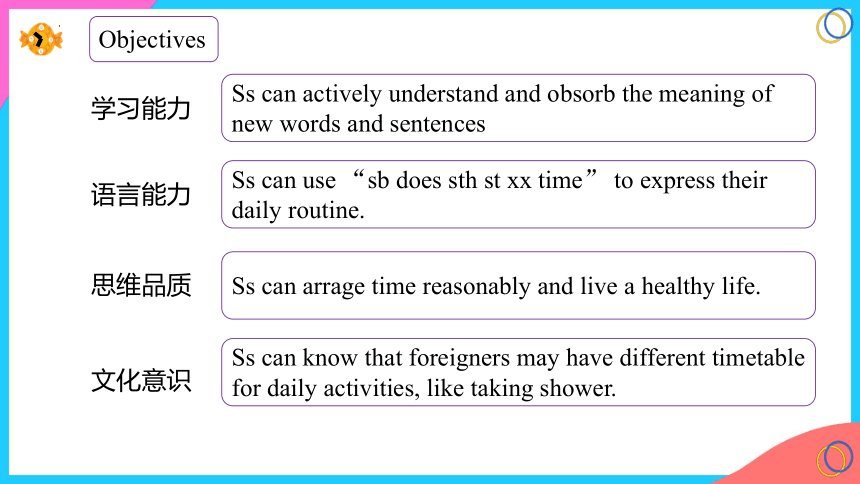
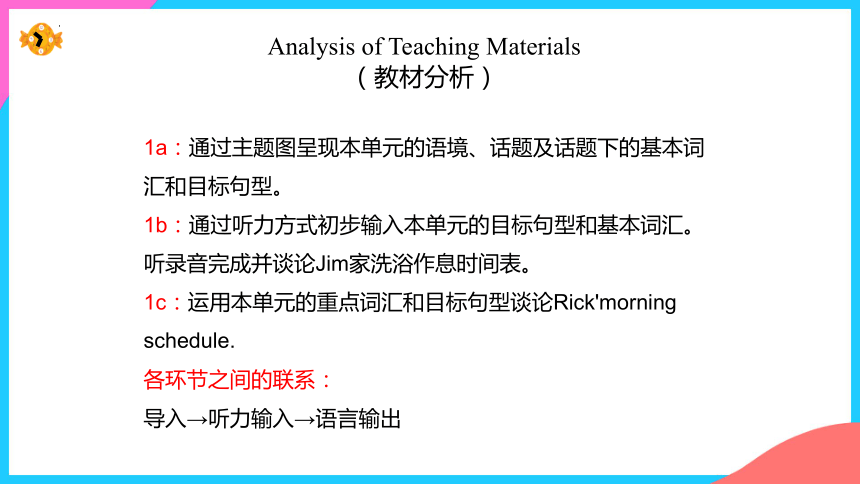
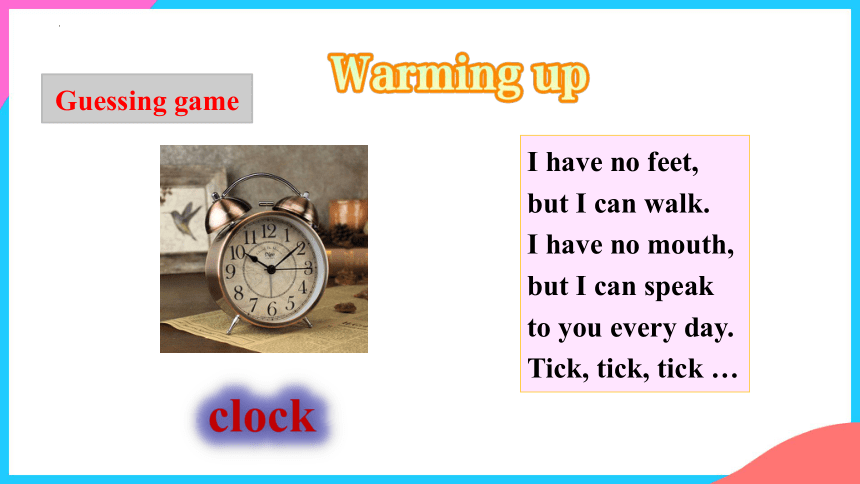
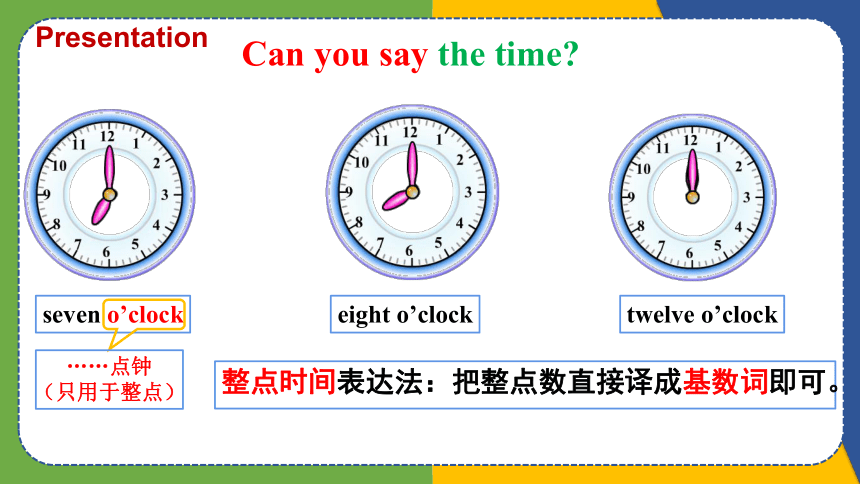
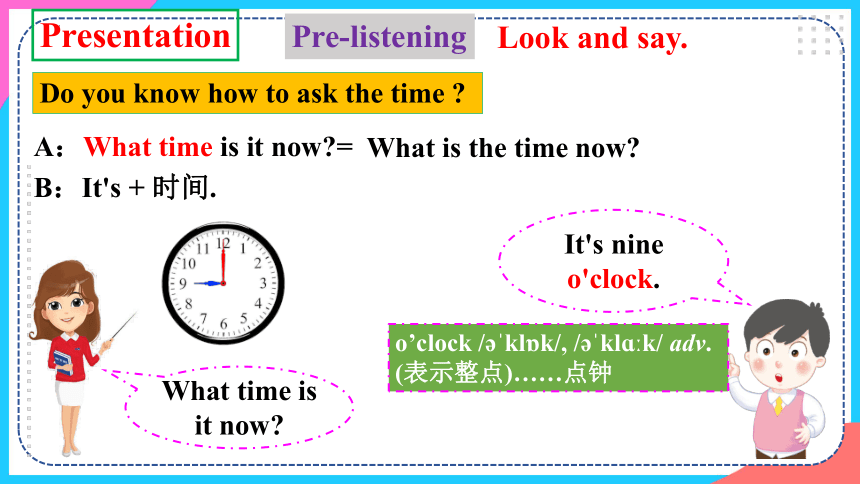
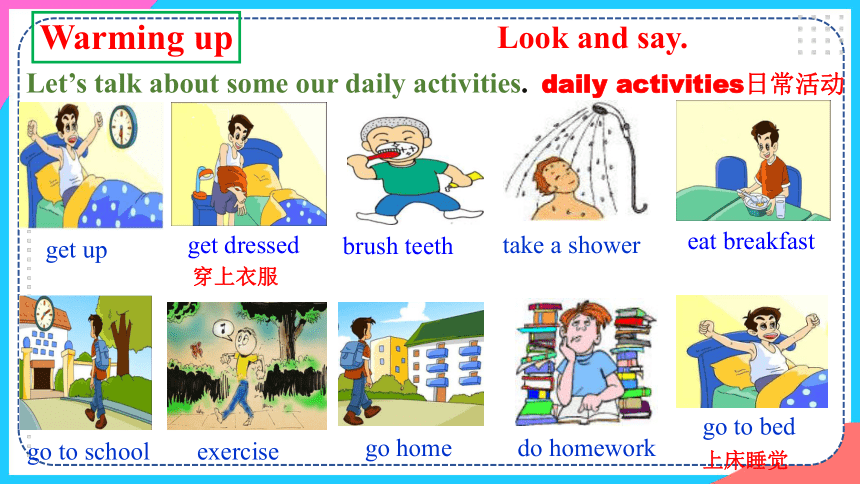
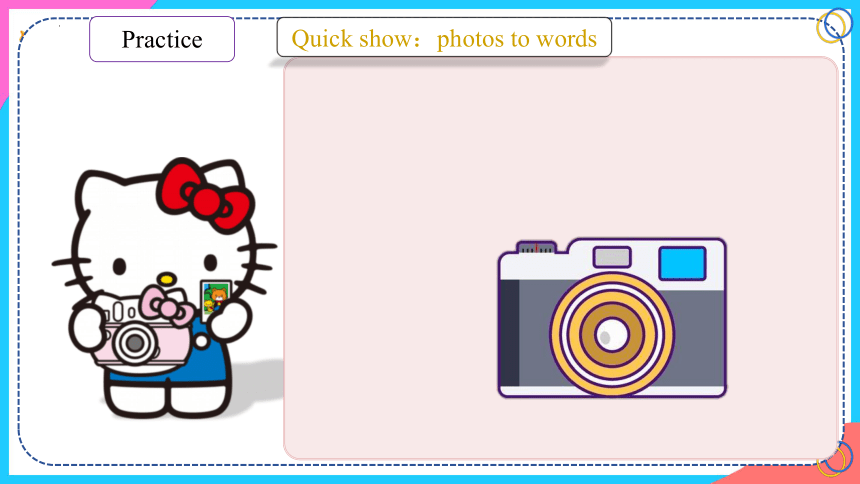
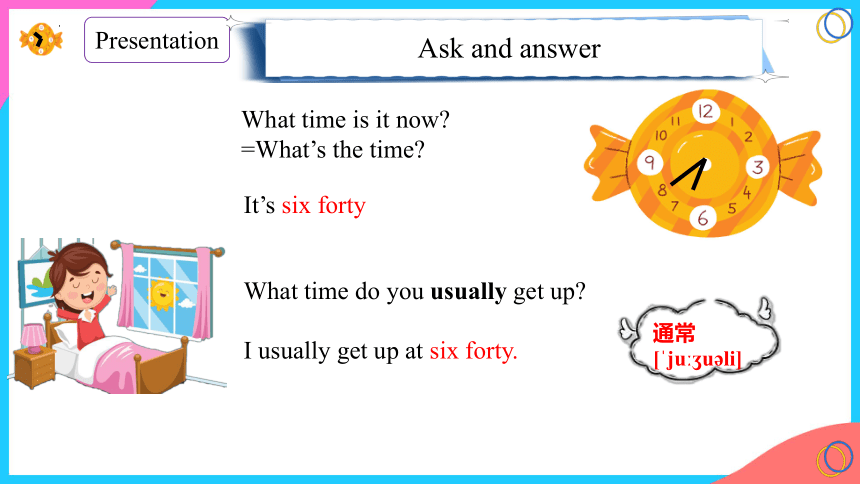
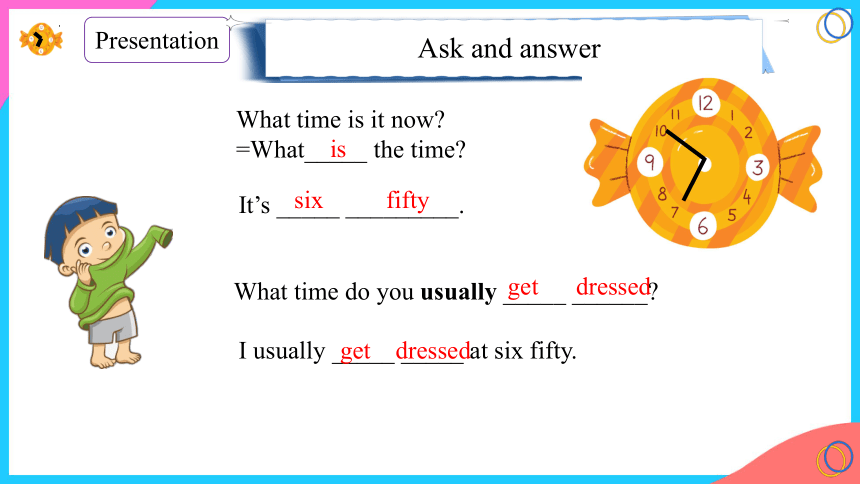
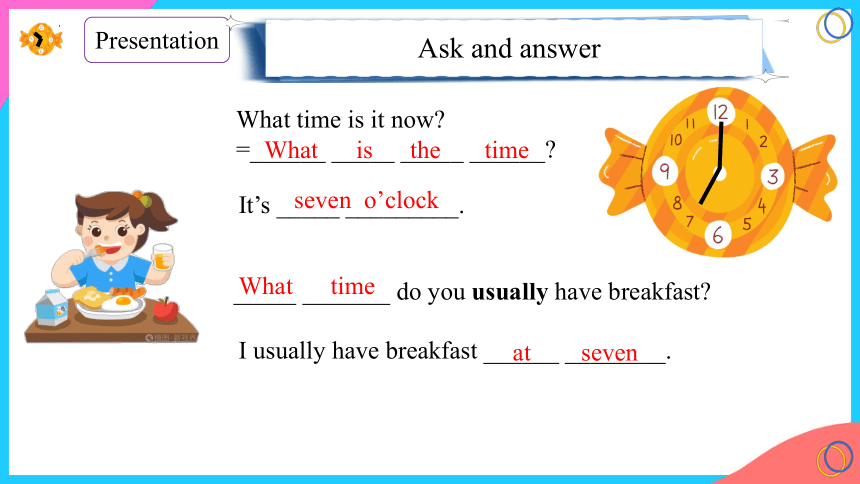
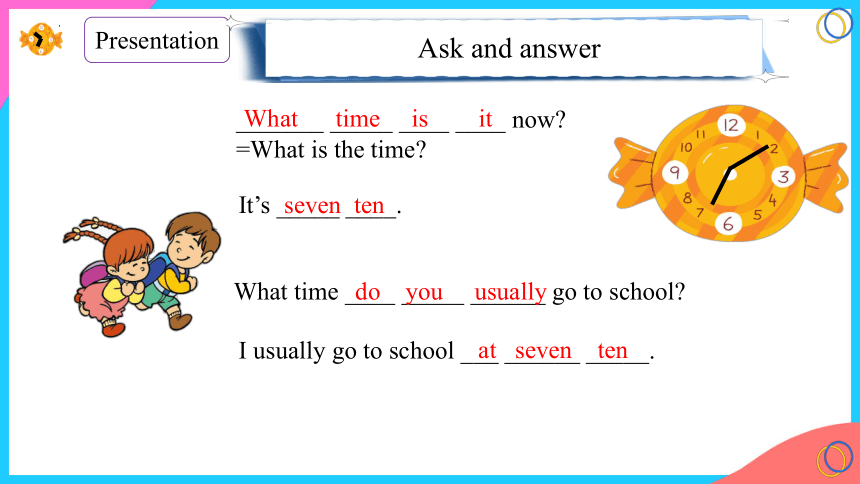
文档简介
(共54张PPT)
Section A 1a--2d
Unit 2
What time do you go
to school
思维品质
语言能力
学习能力
文化意识
Ss can actively understand and obsorb the meaning of new words and sentences
Ss can use “sb does sth st xx time” to express their daily routine.
Ss can arrage time reasonably and live a healthy life.
Ss can know that foreigners may have different timetable for daily activities, like taking shower.
Objectives
Analysis of Teaching Materials
(教材分析)
1a:通过主题图呈现本单元的语境、话题及话题下的基本词汇和目标句型。
1b:通过听力方式初步输入本单元的目标句型和基本词汇。听录音完成并谈论Jim家洗浴作息时间表。
1c:运用本单元的重点词汇和目标句型谈论Rick'morning schedule.
各环节之间的联系:
导入→听力输入→语言输出
Guessing game
I have no feet,
but I can walk.
I have no mouth,
but I can speak
to you every day.
Tick, tick, tick …
clock
Can you say the time
Presentation
seven o’clock
eight o’clock
twelve o’clock
……点钟
(只用于整点)
整点时间表达法:把整点数直接译成基数词即可。
Presentation
Presentation
Pre-listening
Look and say.
Do you know how to ask the time
A:What time is it now =
B:It's + 时间.
What is the time now
It's nine o'clock.
What time is it now
o’clock / kl k/, / klɑ k/ adv.
(表示整点)……点钟
Presentation
Warming up
Look and say.
get up
get dressed
穿上衣服
take a shower
eat breakfast
Let’s talk about some our daily activities.
daily activities日常活动
brush teeth
go to school
go home
go to bed
上床睡觉
exercise
do homework
Practice
Quick show:photos to words
What time do you usually get up
I usually get up at six forty.
Presentation
Ask and answer
通常
[ ju u li]
What time is it now
=What’s the time
It’s six forty
What time do you usually _____ ______
I usually _____ _____ at six fifty.
Presentation
Ask and answer
What time is it now
=What_____ the time
It’s _____ _________.
is
six fifty
get dressed
get dressed
_____ _______ do you usually have breakfast
I usually have breakfast ______ ________.
Presentation
Ask and answer
What time is it now
=______ _____ _____ ______
It’s _____ _________.
What is the time
seven o’clock
What time
at seven
What time ____ _____ ______ go to school
I usually go to school ___ ______ _____.
Presentation
Ask and answer
_______ _____ ____ ____ now
=What is the time
It’s _____ ____.
What time is it
seven ten
do you usually
at seven ten
Presentation
Lead in
Pre-listening
Look and say.
Look at the picture and answer the questions.
What are the actions of Rick
Is Rick busy or free in the morning
Presentation
Practice
Pre-listening
Look and match.
1a
Match the activities with the picture.
get up ____
go to school
_____
3.get dressed
_____
4. brush teeth
_____
5. eat breakfast
_____
6. take a shower
_____
c
b
e
d
f
a
1.整点:
2.整点+分钟:
观察与思考:怎样用英语表达时间?
顺读法
3.询问几点所用的句型及答语:
点钟数 +o’clock 如:9:00 nine o’clock
点钟数+分钟数 如:10:13 ten thirteen
What time is it /What’s the time
It's + 时间.
Speak out the time as quickly as possible.
six o’clock
seven thirty
three fifteen
eight twenty
one o’clock
eleven forty
seven forty-five
While-listening
get up ____
go to school ____
get dressed ____
brush teeth ____
eat breakfast ____
6. take a shower ____
1b. Listen and match the times with the actions. Draw lines from the clocks to the pictures.
c
f
b
d
e
a
Time Daily Activities
6:30 get up
6:40
brush one’s teeth/ take a shower
7:00
eat breakfast
7:20
get dressed
7:30
go to school
听力记时间时,写数字6:30即可,可以节约时间,是做笔记的技巧。
1. what time询问做某事的时间
2. 表达在某一时刻时前面用介词at
get up 起床;站起
go to school 上学
get dressed 穿上衣服
brush teeth 刷牙
eat breakfast 吃早餐
take a shower 洗淋浴
Presentation
Pair work
Ask and answer.
Post-listening
1c
Student A is the interview. Student B is Rick. Ask and answer
Questions about Rick’s day.
A: What time do you usually…
B: I usually ….at…
6:30
6:40
6:40
7:20
7:00
7:30
假如你是Rick,根据1a 的图片和时间说出你一天的基本活动。可以适当增加内容。
My name is Rick. I’m thirteen. I’m a student. I get up at six thirty every day. Then I brush my teeth and take a shower at six forty. I eat breakfast at seven. I usually get dressed at seven twenty. Then I go to school at seven thirty.
While-listening
Do a report about Rick’s day.
get up
six thirty
brush teeth\
take a shower
six forty
eat breakfast
seven o’clock
get dressed
seven twenty
go to school
seven thirty
Hello, everyone, I will tell you something about Rick. Rick gets up at six thirty, and he brushes his teetch at six forty…
Presentation
Group work
Ask and report.
Post-listening
Talk about Miss Li’s Day
Time Activities
8:00 a.m. gets up
8:20 a.m. eats breakfast
8:30 a.m. goes to work
1:15 p.m. have (has) lunch
7:00 p.m. goes home
8:20 p.m. watches TV
9:30 p.m. takes a shower
11:40 p.m. goes to bed
— What time does she usually get up
— She usually gets up at eight o’ clock am.
Report : My friend Miss Li gets up at …. She eats breakfast at…. She goes to work at…
Presentation
Prediction
Look and say.
Pre-listening
Look at the picture and answer the questions.
1. How many children can you see in the
picture
2. Does Jim have a big family Why do
you think so
3. What does the word “schedule” mean
4. Is it difficult for Jim’s family to take
showers
Four.
Yes. Because Jim has two brothes and two sister.
日程表.
Guess.
Presentation
Listening
Listen and complete.
While-listening
2a
Listen to the conversation and complete the sentences.
Jim has ________brothers and
________sisters. Jim’s family has ______shower.
two
two
one
2b
Listen again. Complete the shower schedule for Jim’s family.
Name Bob Mary Jack Jim Anna
Time 5:30
5:50
6:15
6:30
6:45
做笔记要写关键词,
时间写数字
Jim _______ a big family. He has _______ brothers and two sisters, but they _____ have one shower. Maybe you think it’s _________ for them to take a shower. No, because they have a shower schedule. His brother Bob takes a shower_______ at 5:30.
Fill in the blanks according to the conversation in activity 2b.
has
two
only
difficult
first
while-listening
Listen and follow
Interviewer: You have a big family, don’t you, Jim
Jim: Yes, I have two brothers and two sisters.
Interviewer: Wow! How many showers do you have
Jim: We only have one shower.
Interviewer: Is that difficlut
Jim: No, because we have a shower schedule. My brother Bob takes a shower first at five thirty.
Interviewer: Wow! That’s early!
Jim: Yeah. Then my sister Mary takes a shower at five fifty. Next my brother Jack takes a shower at sis fifteen. I take a shower at six thirty, my sister Anna at six forty-five...
While-listening
Predicting
1. What time do your parents go to work
2. Where does this man work
3. When does he get up
4. When does he go to work
Circle the activities you hear.
exercise take a shower
get up eat breakfast
eat lunch brush teeth
get dressed wash face
go to work play soccer
Listen and answer questions.
get up eat breakfast
exercise go to work
work
8:30
9:00
10:20
11:00
When does he get up
He gets up at eight thirty.
from 12:00 at night to 6:00 in the morning
Presentation
Listening
Listen and fill.
Post-listening
Interviewer: Scott has an interesting _____. He works at a
__________. What time is your radio show
Scott: ______ twelve o’clock at night __ six o’clock in the morning.
Interviewer: _________ do you usually get up
Scott: ___ eight thirty at night. Then I eat breakfast ________.
Interviewer: That’s a funny time _____ breakfast!
Scott: Yeah. _____ that, I usually exercise __ about ten twenty.
Interviewer: ______ do you go to work
Scott: At eleven o’clock, so I’m never late ____ work.
Listen and fill in the blanks.
job
radio station
From
at
What time
At
at nine
for
After
at
When
for
2d
Role-play the conversation.
Interviewer: Scott has an interesting job. He works at a radio station. Scott, what time is your radio show
Scott: From twelve o’clock at night to six o’clock in the morning.
Interviewer: What time do you usually get up
Scott: At eight thirty at night. Then I eat breakfast at nine.
Interviewer: That’s a funny time for breakfast!
Scott: Yeah. After that, I usually exercise at about ten twenty.
Interviewer: When do you go to work
Scott: At eleven o’clock, so I’m never late for work.
Test your memory.
Interviewer: Scott has an interesting job. 他在一家广播电台工作。 Scott, what time is your radio show
Scott: 从晚上12点到早上6点。
Interviewer: 你通常几点起床?
Scott: At eight thirty at night. 然后我在9点吃饭。
Interviewer: That’s a funny time for breakfast!
Scott: Yeah. 在那之后,我经常在10点20左右锻炼。
Interviewer: When do you go to work
Scott: At eleven o’clock, 所以我上班从不迟到。
Retelling
8:30 at night
9:00
10:20
11:00
from 12:00 to 6:00
Scott works in a radio station. He gets up at…
Then
After that
From… to…
05
Language points
get dressed为固定短语,其后不接任何宾语。
1. get dressed 穿上衣服 (教材P7 1a)
Language points
“be dressed in + 衣服/颜色”意为“穿着……”,表示穿的状态。
She is dressed in red. 她穿着红色的衣服。
My young brother is only two years old. He can’t get dressed. 我的弟弟只有两岁,他不会穿衣服。
Language points
2. brush teeth 刷牙(教材P7 1a)
brush /br / v. 刷;刷净 n. 刷子
发音小助手:字母u在brush中发/ /音。字母u发/ /音的单词还有club、 up、 funny、 run等。
(1) brush在此处作及物动词,意为“刷;刷净” ,其第三人称单数形式为brushes。
You should learn to brush your shoes. 你应该学着刷你的鞋。
Language points
Language points
(2) brush还可作可数名词,意为“刷子” ,其复数形式为brushes。
I need some new brushes. 我需要几把新刷子。
v. 刷 brush n. 刷子
Language points
2. brush teeth 刷牙(教材P7 1a)
tooth /tu θ/ n.牙齿
tooth作可数名词,其复数形式为teeth,读作/ti:θ/。
These meat-eating fish have sharp teeth. 这些食肉性的鱼有着锋利的牙齿。
【特别提醒】brush (one’s) teeth意为“刷牙”,其中“牙齿”要用复数形式teeth表达,one’s是形容词性物主代词或名词所有格。
It’s good for you to brush your teeth twice a day. 一天刷两次牙对你有好处。
Language points
【拓展】变复数时将“oo”变成“ee”的名词还有:
foot — feet(脚) goose — geese(鹅)
teeth
feet
geese
Language points
3.eat breakfast 吃早餐(教材P7 1a)
Let’s eat breakfast.我们吃早餐吧。
Laura often has a quick lunch at school.劳拉在学校经常匆忙地吃午餐。
表示一日三餐的名词 (breakfast、lunch、supper/dinner) 前面通常不用冠词,但当其前有某些形容词 (如good、quick、big等) 修饰时,通常要加不定冠词。
【拓展】“三餐”与介词搭配:
“三餐”与介词搭配
“for+三餐”表示“关于早/午/晚饭”
I’d like rice for lunch.午饭我想吃米饭。
“at+三餐”表示“就餐时;进餐时”
My father tells a joke at breakfast.吃早饭时我爸爸讲了一个笑话。
“before/after+三餐”表示“餐前/后”
After dinner, I usually go out for a walk.晚饭后,我通常出去散步。
Language points
4. What time do you usually get up, Rick 里克,你通常几点起床?(教材P7 图片文字)
what time 什么时间
what time用来引导特殊疑问句,提问具体的时间。
What time does the breakfast start 早饭几点开始
Language points
4. What time do you usually get up, Rick 里克,你通常几点起床?(教材P7 图片文字)
usually / ju: u li/ adv. 通常地;一般地
【用法详解】usually 作频度副词,表示某事发生的频率,通常位于实义动词之前,助动词、情态动词或连系动词 be 之后。
Mary usually goes to school at 7. 玛丽通常七点去上学。
位于实义动词之前
I’m usually so early. 我通常都这么早。
位于连系动词be之后
Language points
1. He works at a radio station. 他在一家广播电台工作。(教材P8 2d)
(1) work 在此作不及物动词。worker 是名词,意为“工人”。
Do you work in a school 你是在学校工作吗?
(2) work 还可作不可数名词,指人们在日常生活和工作中从事的体力或脑力劳动,即各类工作。at work 表示“在工作”。
work /w (r)k/ v. & n. 工作
Language points
Language points
【易混辨析】work 与 job
两者作名词,都可意为“工作”,区别如下:
work 不可数名词 泛指抽象意义的工作
job 可数名词 指具体的某种工作或职业
He has a lot of work to do today. 他今天有许多工作要做。
After a long day at work, nothing is better than a good night’s sleep! 工作了一整天,没有什么比睡个好觉更好的了!
Language points
2.From twelve o’clock at night to six o’clock in the morning. 从夜里十二点到早.上六点。(教材P8 2d)
from... to... 从……到……
from... to...可以用来连接两个时间或地点,也可以表示幅度或范围。
We go to school from Monday to Friday. 我们从星期一到星期五上学。(连接两个时间)
Danny goes from Jinan to Wuhan by train. 丹尼乘火车从济南到武汉去。(连接两个地点)
The store sells everything from books to computers. 这家商店出售的商品从书籍到电脑应有尽有。(表示范围)
Language points
3. After that, I usually exercise at about ten twenty. 在那之后,我通常十点二十左右锻炼(身体)。(教材P8 2d)
exercise在此处作动词,意为“锻炼”。
My grandparents exercise every day. 我的爷爷奶奶天天锻炼身体。
【拓展】exercise还可作名词,常见用法如下:
exercise / eks sa z/ v.& n. 锻炼;练习
exercise n.
不可数名词
可数名词
表示“锻炼;运动”,常和take、 do、 get等词连用
表示“一套动作”或“练习,习题”,如do morning exercises做早操
Language points
We often do exercises in English class. 我们经常在英语课上做练习。
【图解助记】exercise的一词多义:
do/take exercise
做运动;锻炼
do eye exercises
做眼保健操
do math exercises
做数学练习题
Language points
Ⅰ.根据语境及所给首字母提示,补全所缺单词。
1. Twenty-one and nineteen is f .
2. —It’s 8:30 p.m. Why do you go to bed so e
—Because I’m too tired (疲劳的).
3. Ben doesn’t like hamburgers, so he n eats them.
4. My grandfather is healthy because he e every
morning.
5. Peter likes basketball and he u plays it after school.
forty
early
never
exercises
usually
Ⅱ. 根据语境及所给汉语提示,写出所缺内容。
1. The ______________(广播电台) is next to No. 6 Middle School.
2. Bob always has many ______________(滑稽好笑的故事) to tell
us.
3. Sally likes to watch TV with her family ______________(在晚上).
4. On school days, we always have lunch ______________(在十一
点五十分).
5. Mr. Smith ______________(去上班) from Monday to Thursday.
radio station
funny stories
at night
/ in the evening
/at eleven fifty / at ten to twelve
goes to work
at 11:50
Tom’s morning routine
Tom is a middle school student. He usually (1)______________ at 7:00. Then he (2)__________________ and (3)__________________. After that, he (4)__________________. Then at about 7:20, he (5)__________________. At about 7:40, he goes to school.
Ⅲ.根据语境及所给图片提示,写出所缺短语。
gets up
brushes (his) teeth
gets dressed
takes / has a shower
eats / has breakfast
Make a survey then write a short report.
My friend
get up
eat breakfast
go to school
brush teeth
take a shower
get dressed
activity
time
name
Report : I usual get up at … I usually eats breakfast at … … My friend × ×
gets up at …. He\She eats breakfast at…. He\She goes to school at…
I
Homework
Time is money. 一寸光阴,一寸金。
Time is life. 时间就是生命。
Time flies. 时光如梭
Do you know these sentences
Section A 1a--2d
Unit 2
What time do you go
to school
思维品质
语言能力
学习能力
文化意识
Ss can actively understand and obsorb the meaning of new words and sentences
Ss can use “sb does sth st xx time” to express their daily routine.
Ss can arrage time reasonably and live a healthy life.
Ss can know that foreigners may have different timetable for daily activities, like taking shower.
Objectives
Analysis of Teaching Materials
(教材分析)
1a:通过主题图呈现本单元的语境、话题及话题下的基本词汇和目标句型。
1b:通过听力方式初步输入本单元的目标句型和基本词汇。听录音完成并谈论Jim家洗浴作息时间表。
1c:运用本单元的重点词汇和目标句型谈论Rick'morning schedule.
各环节之间的联系:
导入→听力输入→语言输出
Guessing game
I have no feet,
but I can walk.
I have no mouth,
but I can speak
to you every day.
Tick, tick, tick …
clock
Can you say the time
Presentation
seven o’clock
eight o’clock
twelve o’clock
……点钟
(只用于整点)
整点时间表达法:把整点数直接译成基数词即可。
Presentation
Presentation
Pre-listening
Look and say.
Do you know how to ask the time
A:What time is it now =
B:It's + 时间.
What is the time now
It's nine o'clock.
What time is it now
o’clock / kl k/, / klɑ k/ adv.
(表示整点)……点钟
Presentation
Warming up
Look and say.
get up
get dressed
穿上衣服
take a shower
eat breakfast
Let’s talk about some our daily activities.
daily activities日常活动
brush teeth
go to school
go home
go to bed
上床睡觉
exercise
do homework
Practice
Quick show:photos to words
What time do you usually get up
I usually get up at six forty.
Presentation
Ask and answer
通常
[ ju u li]
What time is it now
=What’s the time
It’s six forty
What time do you usually _____ ______
I usually _____ _____ at six fifty.
Presentation
Ask and answer
What time is it now
=What_____ the time
It’s _____ _________.
is
six fifty
get dressed
get dressed
_____ _______ do you usually have breakfast
I usually have breakfast ______ ________.
Presentation
Ask and answer
What time is it now
=______ _____ _____ ______
It’s _____ _________.
What is the time
seven o’clock
What time
at seven
What time ____ _____ ______ go to school
I usually go to school ___ ______ _____.
Presentation
Ask and answer
_______ _____ ____ ____ now
=What is the time
It’s _____ ____.
What time is it
seven ten
do you usually
at seven ten
Presentation
Lead in
Pre-listening
Look and say.
Look at the picture and answer the questions.
What are the actions of Rick
Is Rick busy or free in the morning
Presentation
Practice
Pre-listening
Look and match.
1a
Match the activities with the picture.
get up ____
go to school
_____
3.get dressed
_____
4. brush teeth
_____
5. eat breakfast
_____
6. take a shower
_____
c
b
e
d
f
a
1.整点:
2.整点+分钟:
观察与思考:怎样用英语表达时间?
顺读法
3.询问几点所用的句型及答语:
点钟数 +o’clock 如:9:00 nine o’clock
点钟数+分钟数 如:10:13 ten thirteen
What time is it /What’s the time
It's + 时间.
Speak out the time as quickly as possible.
six o’clock
seven thirty
three fifteen
eight twenty
one o’clock
eleven forty
seven forty-five
While-listening
get up ____
go to school ____
get dressed ____
brush teeth ____
eat breakfast ____
6. take a shower ____
1b. Listen and match the times with the actions. Draw lines from the clocks to the pictures.
c
f
b
d
e
a
Time Daily Activities
6:30 get up
6:40
brush one’s teeth/ take a shower
7:00
eat breakfast
7:20
get dressed
7:30
go to school
听力记时间时,写数字6:30即可,可以节约时间,是做笔记的技巧。
1. what time询问做某事的时间
2. 表达在某一时刻时前面用介词at
get up 起床;站起
go to school 上学
get dressed 穿上衣服
brush teeth 刷牙
eat breakfast 吃早餐
take a shower 洗淋浴
Presentation
Pair work
Ask and answer.
Post-listening
1c
Student A is the interview. Student B is Rick. Ask and answer
Questions about Rick’s day.
A: What time do you usually…
B: I usually ….at…
6:30
6:40
6:40
7:20
7:00
7:30
假如你是Rick,根据1a 的图片和时间说出你一天的基本活动。可以适当增加内容。
My name is Rick. I’m thirteen. I’m a student. I get up at six thirty every day. Then I brush my teeth and take a shower at six forty. I eat breakfast at seven. I usually get dressed at seven twenty. Then I go to school at seven thirty.
While-listening
Do a report about Rick’s day.
get up
six thirty
brush teeth\
take a shower
six forty
eat breakfast
seven o’clock
get dressed
seven twenty
go to school
seven thirty
Hello, everyone, I will tell you something about Rick. Rick gets up at six thirty, and he brushes his teetch at six forty…
Presentation
Group work
Ask and report.
Post-listening
Talk about Miss Li’s Day
Time Activities
8:00 a.m. gets up
8:20 a.m. eats breakfast
8:30 a.m. goes to work
1:15 p.m. have (has) lunch
7:00 p.m. goes home
8:20 p.m. watches TV
9:30 p.m. takes a shower
11:40 p.m. goes to bed
— What time does she usually get up
— She usually gets up at eight o’ clock am.
Report : My friend Miss Li gets up at …. She eats breakfast at…. She goes to work at…
Presentation
Prediction
Look and say.
Pre-listening
Look at the picture and answer the questions.
1. How many children can you see in the
picture
2. Does Jim have a big family Why do
you think so
3. What does the word “schedule” mean
4. Is it difficult for Jim’s family to take
showers
Four.
Yes. Because Jim has two brothes and two sister.
日程表.
Guess.
Presentation
Listening
Listen and complete.
While-listening
2a
Listen to the conversation and complete the sentences.
Jim has ________brothers and
________sisters. Jim’s family has ______shower.
two
two
one
2b
Listen again. Complete the shower schedule for Jim’s family.
Name Bob Mary Jack Jim Anna
Time 5:30
5:50
6:15
6:30
6:45
做笔记要写关键词,
时间写数字
Jim _______ a big family. He has _______ brothers and two sisters, but they _____ have one shower. Maybe you think it’s _________ for them to take a shower. No, because they have a shower schedule. His brother Bob takes a shower_______ at 5:30.
Fill in the blanks according to the conversation in activity 2b.
has
two
only
difficult
first
while-listening
Listen and follow
Interviewer: You have a big family, don’t you, Jim
Jim: Yes, I have two brothers and two sisters.
Interviewer: Wow! How many showers do you have
Jim: We only have one shower.
Interviewer: Is that difficlut
Jim: No, because we have a shower schedule. My brother Bob takes a shower first at five thirty.
Interviewer: Wow! That’s early!
Jim: Yeah. Then my sister Mary takes a shower at five fifty. Next my brother Jack takes a shower at sis fifteen. I take a shower at six thirty, my sister Anna at six forty-five...
While-listening
Predicting
1. What time do your parents go to work
2. Where does this man work
3. When does he get up
4. When does he go to work
Circle the activities you hear.
exercise take a shower
get up eat breakfast
eat lunch brush teeth
get dressed wash face
go to work play soccer
Listen and answer questions.
get up eat breakfast
exercise go to work
work
8:30
9:00
10:20
11:00
When does he get up
He gets up at eight thirty.
from 12:00 at night to 6:00 in the morning
Presentation
Listening
Listen and fill.
Post-listening
Interviewer: Scott has an interesting _____. He works at a
__________. What time is your radio show
Scott: ______ twelve o’clock at night __ six o’clock in the morning.
Interviewer: _________ do you usually get up
Scott: ___ eight thirty at night. Then I eat breakfast ________.
Interviewer: That’s a funny time _____ breakfast!
Scott: Yeah. _____ that, I usually exercise __ about ten twenty.
Interviewer: ______ do you go to work
Scott: At eleven o’clock, so I’m never late ____ work.
Listen and fill in the blanks.
job
radio station
From
at
What time
At
at nine
for
After
at
When
for
2d
Role-play the conversation.
Interviewer: Scott has an interesting job. He works at a radio station. Scott, what time is your radio show
Scott: From twelve o’clock at night to six o’clock in the morning.
Interviewer: What time do you usually get up
Scott: At eight thirty at night. Then I eat breakfast at nine.
Interviewer: That’s a funny time for breakfast!
Scott: Yeah. After that, I usually exercise at about ten twenty.
Interviewer: When do you go to work
Scott: At eleven o’clock, so I’m never late for work.
Test your memory.
Interviewer: Scott has an interesting job. 他在一家广播电台工作。 Scott, what time is your radio show
Scott: 从晚上12点到早上6点。
Interviewer: 你通常几点起床?
Scott: At eight thirty at night. 然后我在9点吃饭。
Interviewer: That’s a funny time for breakfast!
Scott: Yeah. 在那之后,我经常在10点20左右锻炼。
Interviewer: When do you go to work
Scott: At eleven o’clock, 所以我上班从不迟到。
Retelling
8:30 at night
9:00
10:20
11:00
from 12:00 to 6:00
Scott works in a radio station. He gets up at…
Then
After that
From… to…
05
Language points
get dressed为固定短语,其后不接任何宾语。
1. get dressed 穿上衣服 (教材P7 1a)
Language points
“be dressed in + 衣服/颜色”意为“穿着……”,表示穿的状态。
She is dressed in red. 她穿着红色的衣服。
My young brother is only two years old. He can’t get dressed. 我的弟弟只有两岁,他不会穿衣服。
Language points
2. brush teeth 刷牙(教材P7 1a)
brush /br / v. 刷;刷净 n. 刷子
发音小助手:字母u在brush中发/ /音。字母u发/ /音的单词还有club、 up、 funny、 run等。
(1) brush在此处作及物动词,意为“刷;刷净” ,其第三人称单数形式为brushes。
You should learn to brush your shoes. 你应该学着刷你的鞋。
Language points
Language points
(2) brush还可作可数名词,意为“刷子” ,其复数形式为brushes。
I need some new brushes. 我需要几把新刷子。
v. 刷 brush n. 刷子
Language points
2. brush teeth 刷牙(教材P7 1a)
tooth /tu θ/ n.牙齿
tooth作可数名词,其复数形式为teeth,读作/ti:θ/。
These meat-eating fish have sharp teeth. 这些食肉性的鱼有着锋利的牙齿。
【特别提醒】brush (one’s) teeth意为“刷牙”,其中“牙齿”要用复数形式teeth表达,one’s是形容词性物主代词或名词所有格。
It’s good for you to brush your teeth twice a day. 一天刷两次牙对你有好处。
Language points
【拓展】变复数时将“oo”变成“ee”的名词还有:
foot — feet(脚) goose — geese(鹅)
teeth
feet
geese
Language points
3.eat breakfast 吃早餐(教材P7 1a)
Let’s eat breakfast.我们吃早餐吧。
Laura often has a quick lunch at school.劳拉在学校经常匆忙地吃午餐。
表示一日三餐的名词 (breakfast、lunch、supper/dinner) 前面通常不用冠词,但当其前有某些形容词 (如good、quick、big等) 修饰时,通常要加不定冠词。
【拓展】“三餐”与介词搭配:
“三餐”与介词搭配
“for+三餐”表示“关于早/午/晚饭”
I’d like rice for lunch.午饭我想吃米饭。
“at+三餐”表示“就餐时;进餐时”
My father tells a joke at breakfast.吃早饭时我爸爸讲了一个笑话。
“before/after+三餐”表示“餐前/后”
After dinner, I usually go out for a walk.晚饭后,我通常出去散步。
Language points
4. What time do you usually get up, Rick 里克,你通常几点起床?(教材P7 图片文字)
what time 什么时间
what time用来引导特殊疑问句,提问具体的时间。
What time does the breakfast start 早饭几点开始
Language points
4. What time do you usually get up, Rick 里克,你通常几点起床?(教材P7 图片文字)
usually / ju: u li/ adv. 通常地;一般地
【用法详解】usually 作频度副词,表示某事发生的频率,通常位于实义动词之前,助动词、情态动词或连系动词 be 之后。
Mary usually goes to school at 7. 玛丽通常七点去上学。
位于实义动词之前
I’m usually so early. 我通常都这么早。
位于连系动词be之后
Language points
1. He works at a radio station. 他在一家广播电台工作。(教材P8 2d)
(1) work 在此作不及物动词。worker 是名词,意为“工人”。
Do you work in a school 你是在学校工作吗?
(2) work 还可作不可数名词,指人们在日常生活和工作中从事的体力或脑力劳动,即各类工作。at work 表示“在工作”。
work /w (r)k/ v. & n. 工作
Language points
Language points
【易混辨析】work 与 job
两者作名词,都可意为“工作”,区别如下:
work 不可数名词 泛指抽象意义的工作
job 可数名词 指具体的某种工作或职业
He has a lot of work to do today. 他今天有许多工作要做。
After a long day at work, nothing is better than a good night’s sleep! 工作了一整天,没有什么比睡个好觉更好的了!
Language points
2.From twelve o’clock at night to six o’clock in the morning. 从夜里十二点到早.上六点。(教材P8 2d)
from... to... 从……到……
from... to...可以用来连接两个时间或地点,也可以表示幅度或范围。
We go to school from Monday to Friday. 我们从星期一到星期五上学。(连接两个时间)
Danny goes from Jinan to Wuhan by train. 丹尼乘火车从济南到武汉去。(连接两个地点)
The store sells everything from books to computers. 这家商店出售的商品从书籍到电脑应有尽有。(表示范围)
Language points
3. After that, I usually exercise at about ten twenty. 在那之后,我通常十点二十左右锻炼(身体)。(教材P8 2d)
exercise在此处作动词,意为“锻炼”。
My grandparents exercise every day. 我的爷爷奶奶天天锻炼身体。
【拓展】exercise还可作名词,常见用法如下:
exercise / eks sa z/ v.& n. 锻炼;练习
exercise n.
不可数名词
可数名词
表示“锻炼;运动”,常和take、 do、 get等词连用
表示“一套动作”或“练习,习题”,如do morning exercises做早操
Language points
We often do exercises in English class. 我们经常在英语课上做练习。
【图解助记】exercise的一词多义:
do/take exercise
做运动;锻炼
do eye exercises
做眼保健操
do math exercises
做数学练习题
Language points
Ⅰ.根据语境及所给首字母提示,补全所缺单词。
1. Twenty-one and nineteen is f .
2. —It’s 8:30 p.m. Why do you go to bed so e
—Because I’m too tired (疲劳的).
3. Ben doesn’t like hamburgers, so he n eats them.
4. My grandfather is healthy because he e every
morning.
5. Peter likes basketball and he u plays it after school.
forty
early
never
exercises
usually
Ⅱ. 根据语境及所给汉语提示,写出所缺内容。
1. The ______________(广播电台) is next to No. 6 Middle School.
2. Bob always has many ______________(滑稽好笑的故事) to tell
us.
3. Sally likes to watch TV with her family ______________(在晚上).
4. On school days, we always have lunch ______________(在十一
点五十分).
5. Mr. Smith ______________(去上班) from Monday to Thursday.
radio station
funny stories
at night
/ in the evening
/at eleven fifty / at ten to twelve
goes to work
at 11:50
Tom’s morning routine
Tom is a middle school student. He usually (1)______________ at 7:00. Then he (2)__________________ and (3)__________________. After that, he (4)__________________. Then at about 7:20, he (5)__________________. At about 7:40, he goes to school.
Ⅲ.根据语境及所给图片提示,写出所缺短语。
gets up
brushes (his) teeth
gets dressed
takes / has a shower
eats / has breakfast
Make a survey then write a short report.
My friend
get up
eat breakfast
go to school
brush teeth
take a shower
get dressed
activity
time
name
Report : I usual get up at … I usually eats breakfast at … … My friend × ×
gets up at …. He\She eats breakfast at…. He\She goes to school at…
I
Homework
Time is money. 一寸光阴,一寸金。
Time is life. 时间就是生命。
Time flies. 时光如梭
Do you know these sentences
同课章节目录
- Unit 1 Can you play the guitar?
- Section A
- Section B
- Unit 2 What time do you go to school?
- Section A
- Section B
- Unit 3 How do you get to school?
- Section A
- Section B
- Unit 4 Don't eat in class.
- Section A
- Section B
- Unit 5 Why do you like pandas?
- Section A
- Section B
- Unit 6 I'm watching TV.
- Section A
- Section B
- Review of Units 1-6
- Unit 7 It's raining!
- Section A
- Section B
- Unit 8 Is there a post office near here?
- Section A
- Section B
- Unit 9 What does he look like?
- Section A
- Section B
- Unit 10 I'd like some noodles.
- Section A
- Section B
- Unit 11 How was your school trip?
- Section A
- Section B
- Unit 12 What did you do last weekend?
- Section A
- Section B
